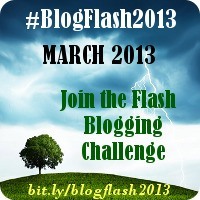
For some unknown reason – oh wait, it's procrastination! – I have decided to try my hand at the 2013 Flash Blogging Challenge. Here are the rules:

"If you believe your toilet seat will be plated with solid gold when you finally publish a book, think again. Countless writers make very little money. Granted, some of us do very well, others even better, but this isn't a profession that guarantees riches."Still, this post isn't about the passion for writing which ultimately drives us to create, while finding other gainful means of affording life necessities. It's about the numbers.
"No matter where you are in your journey as a writer, the editing and notes process remains arduous and stressful. It will always test you . . . Ultimately, rewriting is hard. Maybe even harder than staring at a blank page."Thanks to the internet, many articles and posts discussing tips for revision are readily available, so rather than also describing basic methods for improving writing, I have included links to several quality examples. This post will focus instead on the overall process – not how to revise, but rather what steps revising in itself requires.
"Doing NaNo will kill (or at the very least, muffle) that pesky internal editor voice that streams along in your head as you write, telling you that what you write is crappy and stupid and pointless. You don't have time for that voice during NaNo. If you want to finish, you are going to have to keep writing those crappy words. NaNo is about quantity not quality. Repeat that after me: quantity not quality. Write it on a sign and tape it to your computer screen. No, you are not writing the word Bluh over and over, but some days it will feel like it. Whatever. Keep writing anyway –"

Like most who write on the topic, I feel pressed to include the aside that NO legitimate agent will ever ask for money up-front from an author—and the same goes for a publishing house. Agent’s make ~15% of the money an author earns from publishing, and publishing houses make money from the sale of the books/e-books. In neither case should a writer be paying the entity directly—with the exception of vanity presses. If an agent or publishing house asks you for money, it is a scam.
“The real secret is that anyone can write a book. There’s no initiation ceremony. No dues to pay. You don’t need a special degree from a fancy school. Writing is for everyone.”